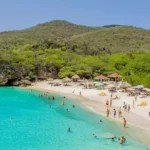Living in Portugal is an increasingly popular choice for expats, drawing individuals from America, Britain, and beyond. Its strategic location on the Iberian Peninsula offers easy access to the Atlantic and Mediterranean, and other European countries, making it a fantastic base for travel and exploration. However, it’s crucial for expats to carefully analyze the pros and cons of life in Portugal against their personal preferences to gauge whether moving to Portugal is the right decision.
The slow-paced yet vibrant lifestyle captivates newcomers, but this must be balanced with equally slow bureaucratic processes and cultural misunderstandings. While living in Portugal is an absolute thumbs up from Global Citizen Solutions, we’ve created this expert expat guide to help you navigate these considerations before making the big move to this Western European gem.
Here, we offer insights on:
The Advantages of Living in Portugal (Pros)
Portugal is a budget-friendly option for easier savings compared to other Western European countries. The country also boasts a high quality of life, supported by excellent education and healthcare systems. Here are some incredible benefits of living in Portugal:
1. Safe environment with low crime rates

The Global Peace Index also placed Portugal as the seventh safest country, following other European countries like Iceland, Denmark, Ireland, and Austria.
The crime rate in Portugal is notably low compared to other European countries, and you’ll notice this difference when you live here. This commitment to safety creates a stable and secure atmosphere for residents and visitors alike.
Moreover, the friendly locals add to Portugal’s charm. They treat guests with warmth and kindness, enhancing the overall quality of life. Even if you don’t speak Portuguese, you’ll often find someone willing to help you in English.
2. Affordable cost of living
The cost of living in Portugal is remarkably budget-friendly, especially compared to countries like the UK, Ireland, France, Germany, and even neighboring Spain. This reputation attracts many expats and digital nomads seeking an affordable lifestyle.
Living in Portugal is significantly cheaper than in the US, where costs can be around 42 percent higher. If you’re moving from major US cities like New York or San Francisco, you’ll find a considerably lower cost of living here.
Moreover, Portugal offers high-quality real estate, dining, groceries, and everyday goods at prices that won’t strain your finances. This makes it possible to enjoy a high quality of life in this beautiful country, where affordability meets exceptional living standards.
See the table below for a closer look at average prices in Portugal.
Expenditure | Average Cost |
Dinner for two people in a good restaurant | €30 |
Loaf of bread | €1,09 |
A dozen eggs | €2,19 |
1 L of Milk | €0,69 |
1 L of Petrol | €1,52 |
Unlimited Internet Bill | €35 per month |
Electricity bill | €50 per month |
Water Bill | €20 per month |
*Numbers are estimates and can vary by city.
3. High quality of life

Residents benefit from a strong sense of security, with low crime rates and friendly neighborhoods that promote a welcoming atmosphere. The combination of modern amenities and traditional charm enhances daily living, offering a balanced lifestyle.
In our Global Intelligence Unit’s Global Digital Nomad Report, Portugal secured an impressive 7th overall ranking, achieving 3rd place for Visa Benefits and 9th for Quality of Life.
Access to nature, cultural activities, and a focus on health contributes to an overall enriching experience, making it an ideal destination for both digital nomads and long-term residents.
4. Excellent healthcare system
The Portugal healthcare system is robust, allocating approximately 9.53% of its GDP to healthcare annually, according to Global Health Expenditure 2022. The public healthcare system, Serviço Nacional de Saúde (SNS), provides free medical care to citizens and residents, ensuring access to essential services.
For those seeking quicker service and high-quality care, many choose private clinics, which are widely available through health insurance or upfront payments. Notably, private healthcare is often more affordable than in many other European countries, offering a range of tailored policies to meet individual needs.
Moreover, almost all healthcare professionals in the private sector speak English, making it easier for expats to navigate their health insurance options and receive prompt, effective treatment.
5. Quality education options
The Portuguese education system offers various options for families. The country is known for its excellent educational standards, attracting many international students. Graduates from Portuguese universities can work across the EU, making it an appealing choice for families living in Portugal. In our Global Intelligence Unit’s Global Education Report, Portugal ranked 24th globally.
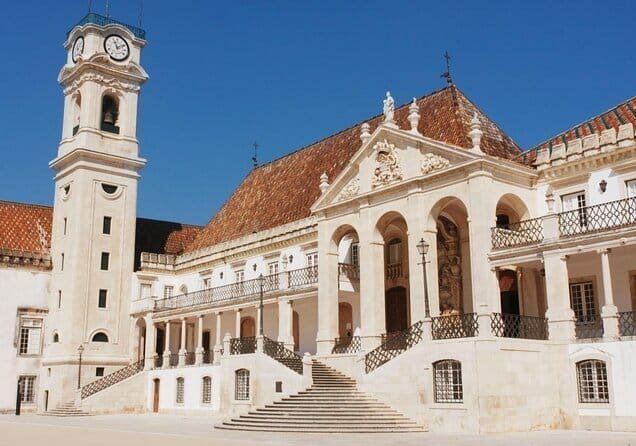
These universities provide free education for citizens and legal residents, including those with a Golden Visa. Most university courses are available in Portuguese and English, catering to expats and ensuring accessibility.
Portugal also has numerous highly rated international schools, especially in major cities. Notable options include the Carlucci American International School, the International Christian School of Cascais, the Lisbon International School, and the Oeiras International School.
These schools offer diverse curricula, such as the International Baccalaureate, and emphasize a multicultural environment that fosters respect for various cultures. They also provide a holistic curriculum that encourages critical thinking and creativity.
Families living in Portugal can take advantage of this vibrant educational landscape, ensuring their children receive a well-rounded education while adapting to life in a new country.
6. Several immigration schemes offer residency in Portugal
The Portuguese government offers a range of flexible visa options that cater to various needs, making it easier for expats to find the right fit for their circumstances. The Portugal Golden Visa program, in particular, allows for residency through real estate investments, while other visas accommodate work, study, and family reunification.
7. Attractive tax system

Those who qualify for it benefit from a flat tax rate of 20 percent on eligible professional income arising from Portugal and possibly an exemption on professional foreign-sourced income.
They will also be exempted from most foreign-sourced income, such as dividends, interest, capital gains, and rents. However, unlike under the previous NHR program, this excludes pensions. These benefits will last for 10 years.
8. Accessible public transportation
Portugal has a reliable public transportation system that includes buses, trams, and trains, making it easy to navigate cities and explore the countryside. This accessibility allows residents to travel without the need for a car.
The convenience of public transit not only enhances daily commuting but also encourages exploration of various regions. This ease of movement is a significant advantage for those living in Portugal.
9. Ease of property ownership for foreigners
Portugal has relatively straightforward regulations regarding property ownership for foreigners. Many expats find that purchasing a home or investment property is a feasible and attractive option. This accessibility opens doors for those looking to invest in real estate or find a permanent residence. The thriving property market offers a variety of options to suit different preferences and budgets.
As noted by a Global Citizen Solutions client, “Navigating the Portuguese real estate market is seamless for foreigners, making the move to Portugal worthwhile for my family.”
10. Diverse expat community

Wherever you choose to reside, you’re likely to encounter someone from your background or connect with a welcoming international community. The most prominent expat hubs are in the Algarve, Lisbon, and Porto.
Many expatriates are retirees enjoying Portugal’s serene environment, while digital nomads take advantage of the country’s thriving startup scene.
Additionally, young families are drawn to Portugal for their children’s higher quality of life. This blend of cultures adds to the richness of life in Portugal, making it an even more appealing place to call home.
11. Good work-life balance
Many Portuguese companies emphasize the importance of a healthy work-life balance. This focus allows employees to prioritize personal time and family, creating a more fulfilling lifestyle.
The balance between work and leisure is evident in everyday life, where long lunches and relaxed weekends are common. This approach contributes to overall happiness and satisfaction among residents.
12. English is widely spoken
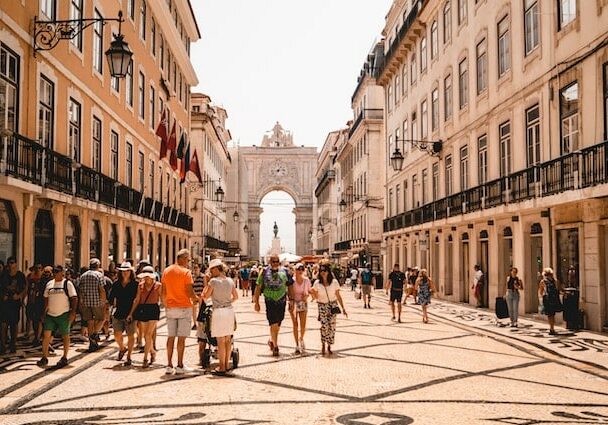
The country’s high ranking in the EF English Proficiency Index – 8th out of 113 countries – reflects an effective education system emphasizing English.
The report states, “This high proficiency level reflects Portugal’s focus on English in its educational system and its citizens’ engagement with global commerce and culture.”
This friendly atmosphere and a population eager to help foster a sense of belonging allowed newcomers to integrate smoothly into Portuguese life.
12. Warm climate
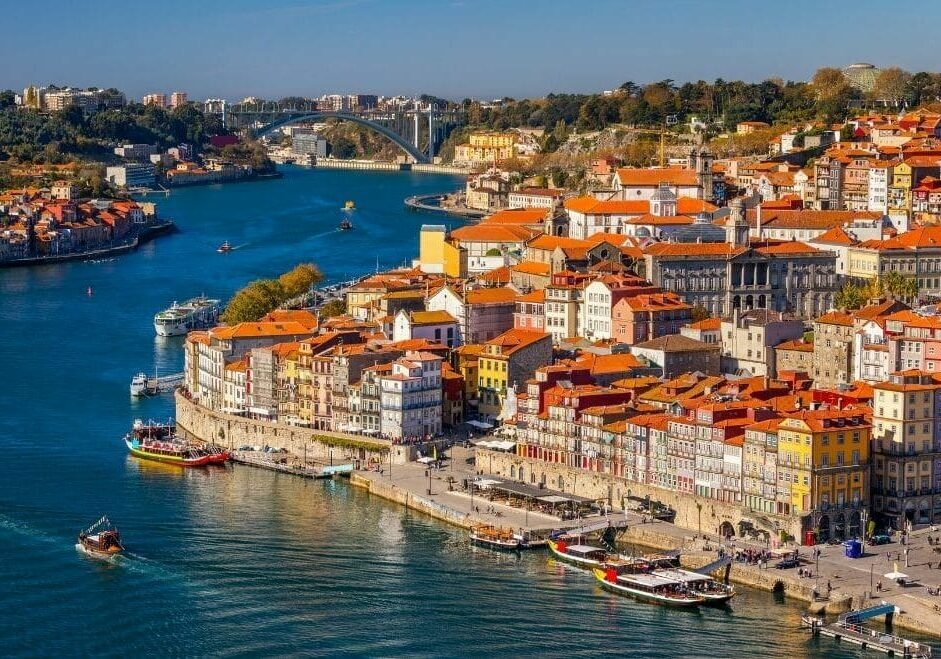
Mild winters and warm summers create an inviting atmosphere for activities like hiking, surfing, and enjoying beach days with family and friends.
This diverse climate also enhances the overall quality of life, as residents can partake in outdoor markets, festivals, and leisurely walks in picturesque settings. Ultimately, the sunny weather contributes to a positive and vibrant atmosphere that encourages a healthy, active lifestyle.
13. Proximity to other European destinations
Portugal’s location makes it a convenient base for exploring Europe. Major cities like Lisbon and Porto have international airports with direct flights to various destinations.
This accessibility allows residents to take quick weekend trips to other countries, enriching their travel experiences. Living in Portugal means you can easily embrace the cultures and adventures of nearby nations.
14. Friendly locals
The Portuguese are known for their warmth and hospitality, making it easy for newcomers to feel at home. Locals often go out of their way to assist visitors, offering help with directions or recommendations for local hotspots.
This welcoming attitude fosters connections and friendships, helping expats integrate into their communities. The genuine kindness of the people enhances the overall experience of living in Portugal.
15. Beautiful landscapes
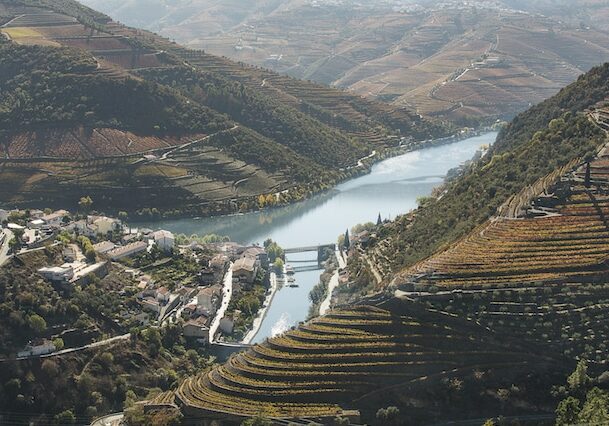
The scenery is wonderfully diverse, from the Algarve’s rugged cliffs to the Douro Valley’s lush vineyards. The beaches, with their golden sands and clear waters, are especially popular among locals and expats.
The Alentejo region features rolling hills and serene countryside, perfect for hiking and outdoor activities. Meanwhile, the Azores offer stunning volcanic landscapes and rich biodiversity.
Portugal is also home to UNESCO World Heritage Sites, such as the Douro Valley and the historic town of Sintra, which enhance its natural beauty.
16. Rich cultural heritage
Portugal has a deep and varied history that is reflected in its architecture, traditions, and festivals. From historic castles to colorful azulejos (tiles), the country’s cultural richness is apparent everywhere you go.
This heritage not only adds character to daily life but also provides opportunities to participate in local traditions and celebrations. Festivals and cultural events bring communities together, showcasing Portugal’s vibrant history.
17. Opportunities for outdoor activities
With its diverse landscapes, Portugal is a paradise for outdoor enthusiasts. Whether hiking in national parks, surfing on the coast, or cycling along scenic routes, there’s no shortage of activities to enjoy.
The mild climate supports year-round outdoor adventures, encouraging residents to stay active and connect with nature. This focus on outdoor living enhances overall well-being and quality of life.
18. Growing tech and startup scene

A major event is the Web Summit, an annual technology conference that has been held in Lisbon since 2016. It brings together big companies and startups to talk about internet technology, new trends, and investment.
This friendly environment encourages teamwork and connections, making it a great place for tech professionals.
Many young people come to Portugal looking for exciting challenges and opportunities.
19. Strong emphasis on sustainability
Portugal places a strong emphasis on sustainability, making it an appealing destination for environmentally conscious individuals.
The country has made significant strides in renewable energy, with a large portion of its electricity coming from wind and solar sources. Many cities promote eco-friendly initiatives, from waste reduction to urban green spaces, fostering a culture of environmental responsibility.
Local markets often feature organic produce, and there’s a growing interest in sustainable tourism. This commitment to sustainability allows expats to engage in practices that benefit both the community and the planet.
20. Delicious cuisine and thriving wine culture
Portugal is renowned for its delicious cuisine and vibrant wine culture, offering a feast for the senses. From fresh seafood dishes like bacalhau to traditional pastries such as pastéis de nata, there’s a rich variety of flavors to explore. The country is also famous for its excellent wines, particularly Port and Vinho Verde, which complement meals perfectly.
Dining out in Portugal is not just about the food; it’s also a social experience, often enjoyed with friends and family. This culinary heritage provides expats with the opportunity to indulge in new tastes while connecting with local culture.
The Drawback of Living in Portugal (Cons)
Living in Portugal comes with its own pros and cons, much like any other country. While there are many advantages to life here, expats may also face some challenges. These often revolve around the following points:
1. Slow bureaucracy
Navigating bureaucracy in Portugal can be frustrating, as processes often take longer than expected. Delays in applying for permits or dealing with government offices can lead to confusion. This slow pace is particularly challenging for newcomers unfamiliar with the system. Patience becomes essential when handling official matters.
2. Weather extremes in summer
Portugal’s summer temperatures can reach uncomfortable highs, especially in inland areas. These heatwaves may limit outdoor activities and social interactions. Residents often need to adjust their daily routines to cope with the heat. Awareness of seasonal changes is crucial for comfort.
3. You often need to have cash on hand
While credit cards are common in urban areas, many local businesses still prefer cash. This can be inconvenient for those used to a cashless lifestyle. Expats may find themselves frequently withdrawing money from ATMs, which can incur fees. Managing cash effectively is important for daily life.
4. High seasonal tourism impact
Portugal’s popularity as a tourist destination leads to overcrowding in peak seasons. This influx can disrupt daily life and make local experiences feel less authentic. Residents may struggle to enjoy their favorite spots without navigating crowds. Adapting to tourist seasons requires flexibility and planning.
5. Cultural misunderstandings
Cultural misunderstandings can arise as newcomers navigate social interactions. Different social norms may lead to confusion or unintended offense. Being open to learning about local customs is crucial for building relationships. Engaging with locals can enhance integration into Portuguese society.
6. Accessibility issues in remote areas
Accessibility can be challenging in rural regions, where public transport options may be limited. This can make it difficult to travel for work or social activities. Expats without cars may feel isolated in these areas. Understanding local resources is key to overcoming this hurdle.
7. Cultural resistance to change
Some communities may exhibit resistance to change, valuing traditional customs. This can create challenges for expats trying to integrate or introduce new ideas. Navigating these dynamics requires patience and understanding. Building relationships with locals can help bridge cultural gaps.
8. Overcrowding in public health centers
While healthcare in Portugal is generally excellent, public health centers can be overcrowded. Long wait times for appointments can be frustrating, especially during peak seasons. Expats may need to explore private healthcare options for quicker service. Awareness of these challenges is essential for planning.
9. Limited job opportunities
Job opportunities can still be limited, particularly for non-Portuguese speakers. Many expats find it challenging to secure well-paying positions without language skills. This can lead to considering other countries for better prospects. Networking and local advice can help navigate this landscape.
10. Limited childcare options in some areas
Rural areas often lack sufficient childcare options, creating challenges for families. Parents may struggle to find reliable services, affecting work-life balance. Exploring nearby towns for childcare can complicate daily logistics. Understanding local resources is key for parents.
11. Limited availability of certain international cuisines
While Portugal has a rich culinary scene, some international cuisines may be scarce, especially in rural areas. Expats may miss their favorite dishes or ingredients, requiring adjustments in dining habits. Embracing local cuisine can lead to new culinary experiences. However, trips to larger cities may be necessary for specific tastes.
12. Higher taxes on certain goods
Certain goods and services in Portugal are subject to higher taxes, which can increase costs. This tax structure can impact budgeting for everyday items. Being aware of these additional costs is important for financial planning. Adjusting shopping habits may be necessary to manage expenses.
13. Inconsistent service in rural areas
Service quality can vary significantly between urban and rural areas. Rural locations often experience longer wait times and less attentive service. Expats may need to adjust their expectations when dealing with local businesses. Building relationships can enhance service quality over time.
14. Potential for isolation in rural areas
Living in rural parts of Portugal can sometimes lead to feelings of isolation. Limited social opportunities and distance from urban centers can hinder community connections. Newcomers may find it lonely without easy access to activities. Engaging with local events can help combat isolation.
15. Higher costs for eco-friendly products
Eco-friendly products in Portugal can be more expensive, which may deter some residents. This can pose challenges for those committed to sustainable living. Finding affordable local alternatives is essential for managing costs. Engaging in community sustainability efforts can enhance access to resources.
16. Intense local rivalries can be daunting
Football culture in Portugal is passionate, with intense rivalries that can be overwhelming. Newcomers may find it challenging to navigate these social dynamics. Understanding local loyalties is key to avoiding uncomfortable situations. Embracing this culture can foster community connections.
17. Higher travel costs during peak season
Travelling within Portugal during peak tourist season can lead to inflated prices. Expats may find it more expensive to explore the country during these times. This can strain travel budgets and discourage spontaneous trips. Planning ahead can help mitigate these costs.
18. Property market fluctuations
Portugal’s real estate market can be volatile, particularly in tourist hotspots. Fluctuations in property values may pose risks for buyers. Conducting thorough research is crucial before making investments. Consulting local experts can provide valuable insights into the market.
19. High competition for funding and resources
In sectors like tech and startups, competition for funding can be fierce. Expats may struggle to secure investment in a crowded landscape. This environment can be intimidating for newcomers trying to establish themselves. Networking and leveraging connections can enhance opportunities.
20. Language barriers in rural areas
Language barriers can be significant in rural regions where English is less commonly spoken. Misunderstandings may arise during everyday interactions, impacting social connections. Learning Portuguese can enhance integration and communication. Patience and practice are essential for overcoming language hurdles.
Side-by-side Comparison of the Pros and Cons of Living in Portugal
The Pros of Living in Portugal | The Cons of Living in Portugal |
Safe environment with low crime rates | Slow bureaucracy |
Warm climate | Weather extremes in summer |
Affordable cost of living | You often need to have cash on hand |
High quality of life | High seasonal tourism impact |
Friendly locals | Cultural misunderstandings |
Beautiful landscapes | Accessibility issues in remote areas |
Rich cultural heritage | Cultural resistance to change |
Excellent healthcare system | Overcrowding in public health centers |
Diverse expat community | Limited job opportunities |
Several immigration schemes | Bureaucratic complexity |
Quality education options | Limited childcare options in some areas |
Attractive tax system | Higher taxes on certain goods |
Accessible public transportation | Inconsistent service in rural areas |
Opportunities for outdoor activities | Weather variability can limit options |
Strong sense of community | Potential for isolation in rural areas |
Passionate football culture | Intense local rivalries can be daunting |
Good work-life balance | Higher travel costs during peak season |
Ease of property ownership for foreigners | Property market fluctuations |
Growing tech and startup scene | High competition for funding and resources |
Cultural festivals and events | Crowding during peak festival seasons |
Proximity to other European destinations | Increased travel cost during peak travel |
English is widely spoken | Language barriers in rural areas |
Delicious cuisine and wine culture | Limited availability of certain international cuisines |
Strong emphasis on sustainability | Higher costs for eco-friendly products |
Vibrant nightlife in cities | Noise and crowds during peak hours |
How to Move to Portugal
Three popular immigration schemes for non-EU citizens looking to move to Portugal are the D7 Visa (Passive Income Visa), the Portugal D8 Digital Nomad Visa, and the Portugal Golden Visa.
Portugal D7 Visa
The Portugal D7 Visa is designed for passive income earners, retirees, and anyone looking to relocate to Portugal without making substantial investments. This visa is ideal for non-EU citizens who can prove they have a reliable income source that exceeds the national average of around $820 per month, derived from pensions, real estate, or investments.
Benefits of the Portugal D7 Visa:
- No significant investment required: Unlike the Golden Visa, the D7 Visa allows for a more relaxed lifestyle without the pressure of large financial commitments.
- Fast processing: The application process is efficient, facilitating quicker residency approval compared to other options.
- Inclusion of family members: You can bring your family along, enabling them to benefit from the same residency status.
- Visa-free travel: The D7 Visa grants access to visa-free movement within the Schengen Area, enhancing travel flexibility.
- Rights to live and work: Holders of the D7 Visa have the right to live and work (even a remote job) in Portugal, making it a versatile option for expats.
Once you obtain the temporary D7 Visa, you and your immediate family can enter Portugal. You can then apply for a two-year residency permit, which can be renewed for three additional years. After five years of residency, you may qualify for Portuguese citizenship, making it an excellent pathway for those looking to establish long-term roots.
Portugal Digital Nomad Visa (D8)
The Portugal Digital Nomad Visa caters to remote workers wishing to live in Portugal while employed by companies outside the country. This visa offers the flexibility to enjoy Portugal’s rich culture and lifestyle without needing to secure a local job. It’s an attractive option for digital nomads seeking to blend having a remote job and leisure in a vibrant setting.
Benefits of the Digital Nomad Visa:
- Work remotely from a beautiful location while enjoying Portugal’s lifestyle, including its stunning landscapes, friendly locals, and rich cultural experiences.
- No local employment required: You can maintain your job with a foreign company, allowing you to enjoy the benefits of remote work without the complications of local employment regulations.
- Access to local services and amenities: The visa allows you to take advantage of Portugal’s excellent healthcare, education, and other local services, making everyday life convenient and fulfilling.
- Family inclusion: This visa allows you to bring family members, enabling them to enjoy the benefits of living in Portugal alongside you.
- Flexible duration: The Digital Nomad Visa offers options for renewal based on your work situation, allowing for extended stays in Portugal.
Portugal Golden Visa
The Portugal Golden Visa program is a popular choice for expats looking to gain residency through investment. Launched in 2012, it allows non-EU nationals to secure residency by making qualifying investments in Portugal. After five years, participants can apply for citizenship, making it appealing for those wanting to settle long-term.
Recent updates have refined investment options, which include:
- Investment fund subscription: Minimum €500,000 investment.
- Cultural donations: At least €250,000 to support arts.
- Scientific research: Invest €500,000 in research projects.
- Job creation: Establish ten jobs in Portugal.
- Business investment: Invest €500,000 to enhance a company’s capital with job creation.
Living in Portugal with a Golden Visa not only provides residency but also allows for visa-free travel within the Schengen Area.
Holders are required to spend at least seven days in Portugal during the first year and 14 days in subsequent years. The flexibility to include family members in the application makes the Golden Visa especially appealing for families looking to establish roots in this vibrant country.
The Best Places to Live in Portugal as an Expat

With its breathtaking natural beauty, rich history, political stability, and relatively low cost of living, this beautiful European Union country offers some of the best places to live in Portugal, making it a fantastic choice for anyone looking to start anew.
- Lisbon: The largest city along the Atlantic Ocean buzzes with life, featuring excellent public transport and affordable living costs. It’s popular among digital nomads, with a lively food scene, cozy cafés, and a vibrant culture that fosters connections.
- The Algarve Coast: Known for stunning beaches and delicious seafood, this region, especially Faro, offers a sunny coastal retreat ideal for retirees. Inland Viseu is recognized for its quality of life, great weather, and outstanding healthcare, promoting a welcoming community lifestyle.
- The Silver Coast: Setúbal boasts beautiful Arrábida Natural Park and a vibrant fish market, while Cascais, the Portuguese Riviera, offers stunning coastal living and lovely beaches just a short trip from Lisbon.
- Porto: Nestled along the Douro River, Porto is celebrated for its charming streets, delicious cuisine, and famous Porto wine, making it a wonderful choice for those wanting to immerse themselves in the rich Portuguese lifestyle.
Why choose Global Citizen Solutions for your Immigration Visa?
GLOBAL APPROACH BY LOCAL EXPERTS
- GCS has offices located across Portugal.
- Members of the US-Portugal and UK-Portugal Chambers of Commerce in Portugal, and the Investment Migration Council (IMC).
- Our expert team can help you throughout your journey to secure your Visa.
100% APPROVAL RATE
- Our successful track record in applications provides reassurance to applicants.
- We have helped clients from more than 35 countries secure residency in Portugal.
ALL-ENCOMPASSING SOLUTION
- With a single channel of communication, our approach ensures that you have complete clarity on your application.
- Our BeGlobal® Onboarding System allows for a total flow of information.
TRANSPARENCY AND PRIVACY
- Our pricing is clear and detailed, you will not face any hidden costs.
- All data is stored within a GDPR-compliant database on a secure SSL-encrypted server.
Frequently Asked Questions About Living in Portugal
Is it worth moving to Portugal?
It’s totally worth moving to live in Portugal, where you will find beautiful beaches and climate, an affordable cost of living, high-quality life standards in education and healthcare, outstanding diversity, a very safe life with a low crime rate, and an attractive tax scheme for expats.
Is it better to live in Spain or Portugal?
Portugal’s smaller population and area provide unique advantages for expats. With affordable living, it’s easier to settle in. The ease of residency requirements and access to various social activities also make it appealing.
Can I live in Portugal as a US citizen?
Yes, as a US citizen, you can live in Portugal with a residence permit obtained through Portuguese visas. Options include the Digital Nomad Visa for remote workers, requiring an income of at least four times the Portuguese minimum wage.
What is it like to live in Portugal?
Living in Portugal provides a high quality of life, with a pleasant climate, beautiful landscapes, and a rich cultural scene. It’s a popular choice for retirees, expatriates, and anyone seeking a relaxed and enjoyable lifestyle.
What are the downsides of living in Portugal?
Poor public transport, language barriers, unpredictable weather, and monotonous nightlife are also some of the other unwanted aspects of Portugal.
How much money do you need to live comfortably in Portugal?
Portugal ranks relatively low on OECD indicators for income and education but scores higher for water and air quality. The cost of living in Lisbon is around €533.91 per month for students, while a family of four can expect to spend about €1,872. Many people with a remote job make a comfortable living in Portugal.
What are the dangers of living in Portugal?
You don’t need to worry about any dangers while living in Portugal. Portugal is the third safest country in the world and ranks 4th for peace globally, unlike in most other countries. The locals are kind, friendly, and helpful, ensuring a peaceful life in Portugal.
Is Portugal friendly to foreigners?
Portugal welcomes foreign nationals with open arms, and the Portuguese people are very friendly. Most of the Portuguese locals know how to express themselves in English, which will make it easier for you to communicate everywhere.
What is the downside of retiring to Portugal?
Some cons of retiring in Portugal include the slow pace of life, which doesn’t suit everyone, bureaucracy and long waiting times, the need to carry cash, no central heating, and relatively low salaries compared to other European countries.
Are there any specific cultural customs to be aware of in Portugal?
Yes, there are cultural customs to be aware of in Portugal, especially for expats. Portuguese people value personal space, so avoid standing too close.
Why do expats leave Portugal?
Expats choose to leave Portugal for various reasons. Common reasons include cultural adjustments, rising living costs (including increasing housing prices), and over-tourism.
Do a lot of Americans live in Portugal?
There were over 10,000 US citizens living in Portugal in 2025, according to the Portuguese government. This is the latest data available and reflects a 239 percent increase from 2017.
Does a foreigner need travel insurance when travelling to Portugal?
Yes, foreigners traveling to Portugal should have travel insurance. British expats residing in Portugal can no longer rely on the European Health Insurance Card due to Brexit, making travel insurance essential for covering unexpected medical expenses.
Is Portugal a good place to live?
Yes, living in Portugal as an expat is good. The country offers a high quality of life, a pleasant climate, beautiful landscapes, and a rich cultural scene. It is a popular choice for retirees, expats, and anyone seeking a relaxed and enjoyable lifestyle.

 Gizane Campos
Gizane Campos 
